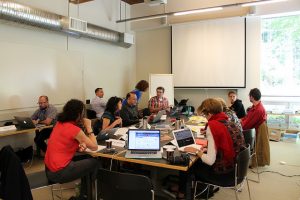What’s the first thing you’d do after four days of non-stop writing, cranking out 48,420 words while locked in a room with a bunch of geography profs? For the folks who were part of BCcampus’ first ever Book Sprint, the answer was “sleep.”
 The book sprint model gave the team its focus.
The book sprint model gave the team its focus.
The sprint brought together a team of five geographers/authors from B.C., a librarian, BCcampus staff, and trained facilitators to write a first year geography open textbook in just four days. From June 9 -12 they hunkered down at University of British Columbia to write British Columbia in a Global Context.
The event was facilitated by German firm BookSprint, and organized by BCcampus.
Collaboration made it happen.
First, the team brainstormed the structure and content of the book. After that came 14-hour days of collaborative writing, researching, editing and reviewing.
It was hard to find appropriate OERs.
It all worked out in the end, but finding the right open resources was difficult.
“We were surprised at how many provincial government resources weren’t actually usable because of their copyright license,” says event organizer and BCcampus Manager of Open Education Clint Lalonde. “We’d find great charts and graphics on a government website that were completely copyrighted.”
In some cases, the team had to go to the source of the data and recreate the material.
Four days, many challenges, and eight chapters later the open textbook is now complete, and BCcampus is already considering how it could reuse the book sprint model.
The textbook will be edited this summer and published in the fall. It will be available electronically as a website, EPUB, MOBI, PDF, and WordPress file. The text will also be available in hard copy through print-on-demand. Update, the textbook is now available in our open textbook collection.
After publication, the open textbook will be distributed to geography profs across B.C. for peer review.
Here’s BCcampus’ advice on how to have a productive book sprint:
- Focus on team composition and team building.
- Prepare a library of open-licensed materials that can be of immediate use.
- Keep in mind that an open textbook is not meant to be just an open-licensed conventional textbook. It’s more of a living text that people will be able to update and adapt to their specific courses and student needs.
- Ensure your librarian is present for the entire session.
- Have at least six writers on your team.
- Use a writing platform that is familiar to the entire team and the facilitators.
- Have a strong, impartial, facilitator who isn’t invested in your project.
- Hire a massage therapist and a yoga instructor to help your team, because being at the keyboard for up to 14 hours a day can put a toll on your body (note: this is a “want-to-have,” BCcampus did not have a budget for these services!).
- Sleep more every night.
The team:
- Five geography professors: Britta Ricker and Cristina Temenos from Simon Fraser University; Aviv Ettya from the University of the Fraser Valley; Siobhán McPhee from the University of British Columbia; and Gill Green from Okanagan College.
- UBC Reference Librarian Jon Strang
- BCcampus support crew of Amanda Coolidge, Manager of Open Education; Clint Lalonde, Client Services Manager; Hilda Anggraeni (the team’s illustrator, who created and contributed dozens of maps and graphs during the sprint); Brad Payne, Technical Analyst; and Christy Foote, Client Services Assistant.
- Barbara Ruehling from BookSprints facilitated the entire event. Faith Bosworth assisted her for the first two days.
Notable quotes:
“We were surprised at how many provincial government resources weren’t actually usable because of their copyright license. We’d find great charts and graphics on a government website that were completely copyrighted.” – Clint Lalonde, Manager of Open Education, BCcampus
“One of the most powerful lessons for me was that I should not simply be focusing on using open textbooks in my courses; I should be encouraging students to build open textbooks as course activities. By doing this, we teach not only discipline specific content, but also increase students’ ability to engage in the democratization of knowledge.” – Gill Green, Geography Professor, Okanagan College
“As academics we get funneled into one specific domain. Writing this intro level textbook allowed me to get outside my area and see what other scholars were doing.” – Britta Ricker, Digital Geographer, Simon Fraser University
“It left me with a fascinating understanding of the breadth of geography.” – Amanda Coolidge, Manager of Open Education, BCcampus
Learn more:
- The textbook “British Columbia in a Global Context” has been published (1 review)
- BCcampus Open Textbook FAQs
- The BC Open Textbook Sprint – the afterglow
- Review the #bcbooksprint hashtag on Twitter
Postscript:
- Tom Wolfe’s A Man in Full has about 370,000 words, and it took him 11 years to write it. According to our math, BCcampus’ BookSprint team could have written the same amount of words in just one month.
